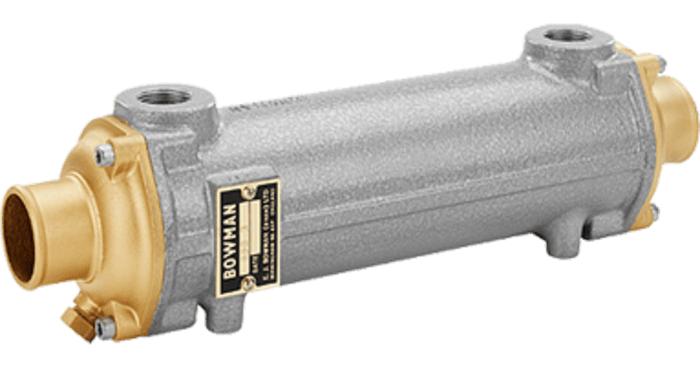Introduction
Vessel oil cooler is a specialized marine heat exchanger designed to cool lubricating oil in the critical systems of ships and boats. Lubricating oil is subjected to high thermal loads during continuous engine operations, and without proper cooling, the oil can degrade, leading to engine inefficiency or damage. Vessel oil coolers ensure oil remains at optimal temperatures, safeguarding key components like main engines, auxiliary engines, gearboxes, compressors, and hydraulic systems. Built with corrosion-resistant materials and a compact structure, these coolers are engineered to withstand harsh marine conditions such as saltwater exposure, constant vibrations, and fluctuating engine loads.
Purpose and Function
Thermal Regulation
The core function is to remove excess heat from circulating lubricating oil. This is crucial because overheated oil loses its lubricity, increasing the risk of friction and wear in moving parts.
Lubrication Protection
By keeping the oil within its ideal viscosity range, the cooler ensures proper film formation between components, reducing direct contact and preventing scoring or pitting of metal surfaces.
Operational Safety
Controlling oil temperature is essential for safe engine operation, especially during extended sea voyages. Overheated oil can lead to engine seizure or failure if not cooled efficiently.
Efficiency Enhancement
By maintaining proper oil temperatures, the cooler helps reduce engine load, improves thermal efficiency, and promotes better fuel economy, especially under varying marine engine loads.
Design and Working Principle
Construction
Typically constructed in shell and tube or plate-type configurations, with design emphasis on ease of maintenance, high thermal conductivity, and corrosion resistance. Shell and tube models are more common in marine use due to their ruggedness and high-capacity handling.
Materials Used
Manufactured using marine-grade alloys such as:
- Stainless Steel 316/316L – for general marine environments.
- Cupronickel 90/10 or 70/30 – offers excellent corrosion resistance in seawater.
- Titanium – highly resistant to both corrosion and fouling.
- Aluminium Brass – a cost-effective alternative for less aggressive conditions.
Working Mediums
- Hot oil from engines or mechanical systems passes through one side.
- Cooling medium, usually seawater or freshwater, passes through the other side.
- Heat is transferred from oil to water, and cooled oil returns to the system.
Mounting
Vessel oil coolers are compact and can be:
- Horizontally installed in engine room base frames.
- Vertically mounted on walls or columns, depending on system design.
Many are equipped with removable tube bundles or easy-access covers for simplified inspection and cleaning.
Applications in the Marine Industry
Used extensively in various shipboard systems:
- Main Propulsion Engines – to keep large diesel engines running reliably.
- Auxiliary Diesel Engines – smaller engines supporting power supply.
- Gearbox Lubrication Systems – vital for marine propulsion control.
- Hydraulic and Steering Gear Systems – for smooth maneuverability.
- Air Compressors and Diesel Generators – for onboard power generation and automation systems.
Advantages of Vessel Oil Coolers
- Prevents Thermal Degradation – Ensures oil remains thermally stable and effective over long operational cycles.
- Improves Machinery Life – Reduces internal friction and mechanical wear, increasing lifespan of engines and components.
- Supports Continuous Duty Operations – Designed for continuous operation in vessels running 24/7.
- Corrosion Resistance in Harsh Environments – Material selection helps resist pitting, scaling, and marine growth.
- Energy Efficiency – Facilitates high heat transfer performance with low pressure drop, reducing overall energy usage.
- Space Saving Design – Engineered to fit tight engine rooms with minimal footprint.
- Easy Maintenance – Tube bundles can be replaced or cleaned without dismantling the full unit.
- Robust Construction – Designed to resist vibrations, shocks, and fluctuations in flow or pressure.
- Built-in Thermostatic Control Options – For better regulation of oil outlet temperature.
- Compliant with Marine Standards – Can be certified by DNV, ABS, Lloyd’s Register, etc., for use in commercial and naval vessels.
Materials Commonly Used
Each material is chosen based on cooling medium and application:
- Stainless Steel 316/316L – High strength and chloride-resistant.
- Cupronickel 90/10 or 70/30 – Excellent for seawater; resists biofouling and corrosion.
- Titanium – Premium option for longevity in highly corrosive or bioactive waters.
- Brass / Aluminium Brass – Used in cost-sensitive marine applications or for freshwater use.
Conclusion
Vessel oil cooler is not just a passive component—it’s a critical safeguard for any marine engine or mechanical system. It protects your oil, your machinery, and ultimately your vessel’s performance. Built with marine-specific materials and robust designs, these coolers deliver consistent and efficient oil temperature regulation, even under demanding oceanic conditions. From propulsion engines to auxiliary systems, the vessel oil cooler is a dependable ally in maintaining system integrity, reducing downtime, and maximizing the lifespan of onboard equipment.

